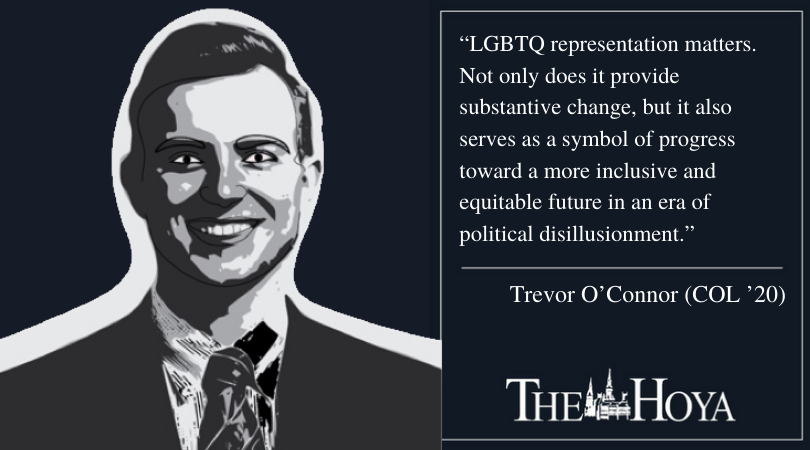Today, our democracy faces a dilemma. As the United States has diversified along lines of race and ethnicity, our legislatures have failed to reflect such demographic shifts. The representation of women in our legislature falls behind that of 74 other countries.
In an age of growing disillusionment, inequality and backlash against “identity politics,” “Representation Gaps” seeks to perform a biopsy on the current state of political representation in the United States. Spanning topics from LGBTQ elected officials to the 2020 presidential race and beyond, the column will explore how marginalized communities find themselves and their issues represented, if at all.
One of the less studied trends in political representation is that of LGBTQ people who, despite stigma and incumbency, are increasingly making their mark in elected office. Although not a guarantor of progress, LGBTQ representation in our legislature is critical to championing, sponsoring and passing equality legislation. As more Americans than ever identify as LGBTQ, our legislatures need to better reflect this segment of the population.
Currently, 806 officials in the United States from the local to the national level openly identify as LGBTQ. Although LGBTQ individuals make up 4 to 8% of the U.S. population, they comprise less than 0.16% of all elected officials. To reach proportional representation, there would need to be more than 20,000 new LGBTQ elected officials across the United States. That’s roughly 25 times more LGBTQ officials.
This deficit in representation matters. Research has found that LGBTQ elected officials are more likely to sponsor pro-equality legislation and champion the fight against anti-LGBTQ bills. Such officials utilize their platforms to highlight personal experiences and connect with such communities, actions even the most ardent ally could not perform. These findings also hold true internationally: The presence of even one LGBTQ elected official “encourages the adoption of gay-friendly legislation.” H.R. 5, better known as the “Equality Act,” was sponsored by David Cicilline (D), a gay representative from Rhode Island, while H.R. 3280, the “LGBTQ Essential Data Act,” was sponsored by Sean Patrick Maloney (D), a gay representative from New York.
Though progress is slow, early signs indicate that 2020 could be a pivotal year for LGBTQ political representation. Not only are more openly LGBTQ candidates running than ever before, but the diversity within the ranks has also increased significantly. Candidates for the 2020 elections include Todd Gloria, running to be the first Latino and LGBTQ mayor of San Diego, and Kim Jackson, running as an LGBTQ Black woman for a seat in Georgia’s state legislature. Countless candidates of color, religious minorities and others across the spectrum of the LGBTQ community are running for the first time. This increased diversity not only better mirrors America demographically, but will also make a substantive difference. LGBTQ people of color are more likely than their white counterparts to center racial and economic justice as part of their activism. It is critical to include these perspectives in decision-making.
Yet barriers still remain. According to Gallup polls, 24% of Americans would refuse to vote for a candidate who identified as gay or lesbian, even if they shared the same views. Despite the current trajectory of Democratic presidential candidate Pete Buttigieg, a 2019 Gallup poll indicated that only 61% of Republicans and 83% of Democrats stated they would vote for a gay or lesbian presidential candidate. Outright bias also remains strong on the campaign trail. Facing dozens of death threats, Christine Hallquist, a transgender candidate for Vermont governor, stopped publicizing her campaign schedule. A New York Times article outlined the harassment many LGBTQ candidates faced in the 2018 midterms such as when one local GOP official called Kansas Representative Sharice Davids (D) a “radical socialist kickboxing lesbian Indian.” LGBTQ candidates of color often find the compounding forces of racism and queerphobia to be particularly strong, especially in an electoral system that favors incumbents through fundraising resources and institutional knowledge. Simply put, if you’re already outside the door, it’s hard to get in.
LGBTQ representation matters. Not only does it provide substantive change, but it also serves as a symbol of progress toward a more inclusive and equitable future in an era of political disillusionment. Organizations and parties should make the recruitment, training and funding of LGBTQ candidates a priority, especially LGBTQ candidates from marginalized backgrounds. I’m under no delusions that such representation will win liberation, but if we believe in equal representation, it’s a grand first step.
Trevor O’Connor is a senior in the College. Representation Gaps appears online every other Tuesday.
This article was updated Feb. 8 to include the correct name of this column and to indicate that Kim Jackson would not be the first LGBTQ Black woman in Georgia’s legislature.















Alum '18 • Jan 25, 2020 at 10:45 am
The line “running to be the first LGBTQ Black woman in Georgia’s legislature” is wrong. Renitta Shannon is a current LGBTQ Black Woman in Georgia’s legislature, and she holds the honor of being the first.
Check facts before you publish, Hoya!!!